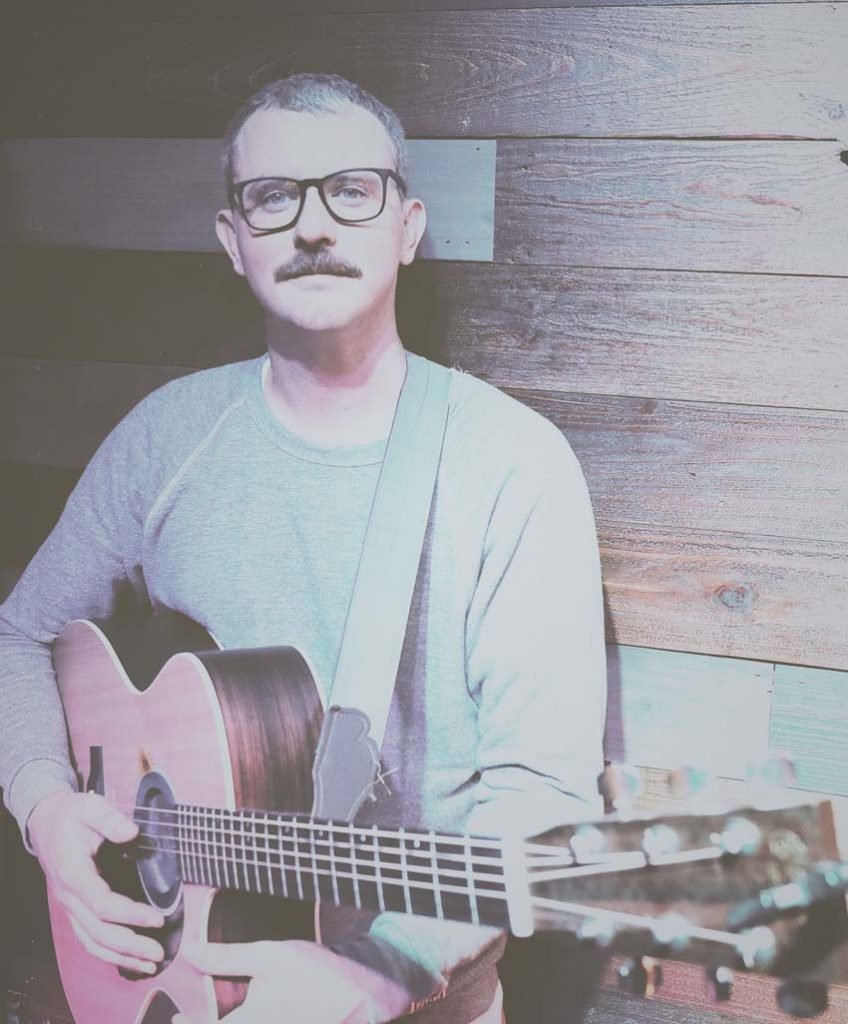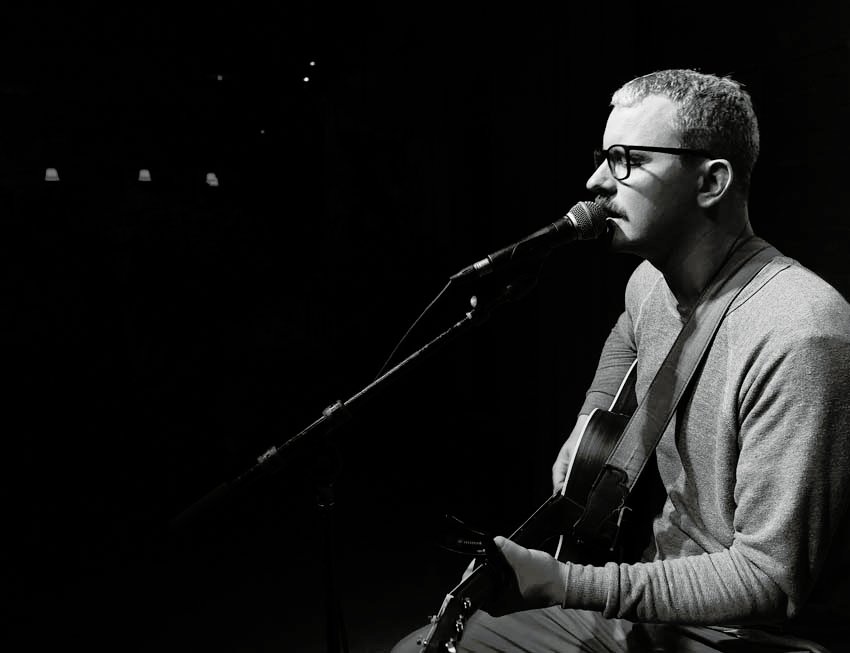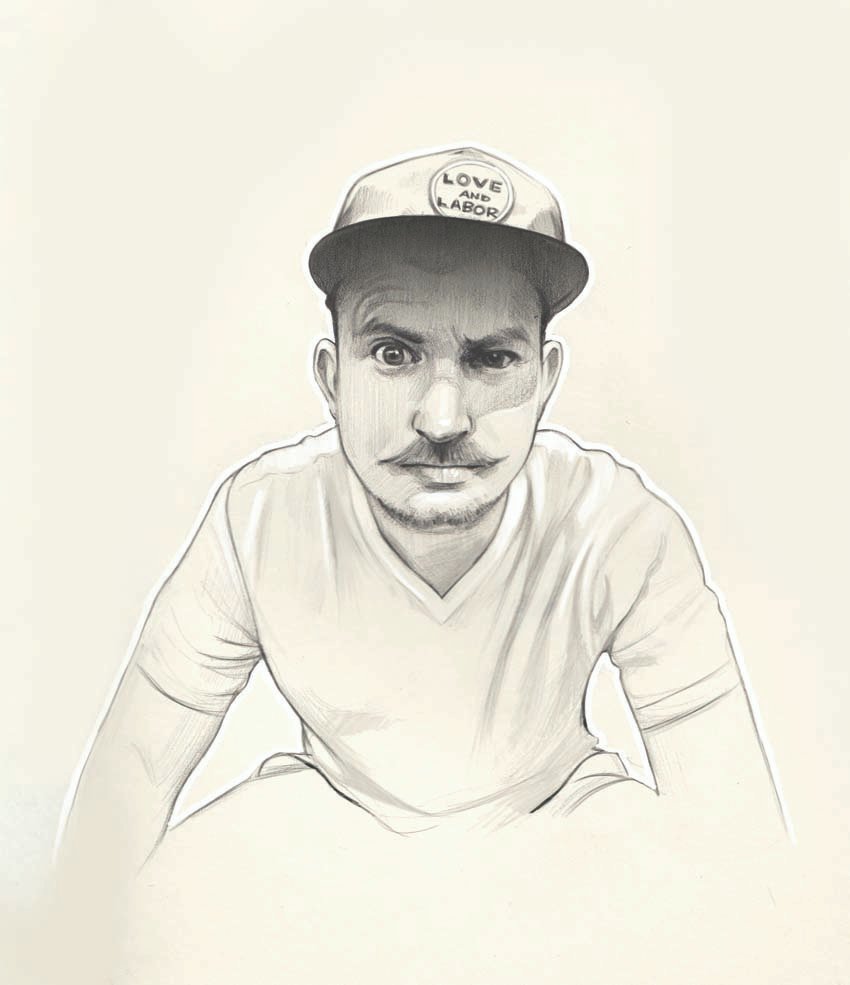+ By Theresa C. Sanchez
If you had the opportunity to start over again, would you? What would it take to press the reset button and begin anew? For local singer-songwriter Joey Harkum, once he made that decision, all he needed to see it through was a full tank of gas, his guitar, and the courage to defy the odds.
One night in September 2017, Harkum was performing with his folky reggae rock group, Pasadena, to a sold-out crowd at Baltimore Soundstage. But only 48 hours later, he was playing for about a dozen people at a dive bar in Raleigh, North Carolina as the Joey Harkum Band.

“I wouldn’t have put 15 years of my life into that brand, building that up to have a national following, only to start all over from scratch,” says Brandon Hardesty, lead singer of the Annapolis-based Bumpin Uglies, musing on Harkum’s decision. He attributes Harkum with giving him his first big break over a decade ago and admired the singer for his willingness to stick it out with Pasadena until he was the last original member left. “Talking about Joey as a musician is one thing, but Joey as a man, I think it’s almost a more important thing. He’s super principled and didn’t compromise his values for a buck. I wouldn’t have done that. He really took the harder road.”

Harkum, 34, grew up in the Riviera Beach neighborhood of Pasadena, Maryland, where he witnessed firsthand the harmful effects of addiction. Music was his refuge and salvation. His father and maternal Irish grandfather played guitar and sang at home and at family gatherings. His father gave him his first and only electric guitar, and while he thought the flashy instrument was “super cool,” he didn’t take to it. He had become accustomed to the acoustic guitar sounds that he’d heard his father play at home.
When Harkum started writing songs, he emulated what he knew, which was the lyric-driven content of the greats his father played, such as Johnny Cash and Willie Nelson. It was fortuitous that his mother owned a karaoke business and operated a machine with recording capabilities. A friend heard Harkum play at a party, requested a tape of his songs, and liked it so much that Harkum ended up making and distributing more tapes.
At age 16, while enrolled in a work-training program to earn his GED, Harkum realized that he could either play music or demo houses. “I really do think playing in that band got us away from [addiction],” says Harkum, who wrote many of his songs about struggles with drugs and alcohol. “We couldn’t sit around. We jumped into touring, touring, and more touring, just trying to make a name for ourselves.”
With Pasadena, Harkum embarked on the open mic circuit and stumbled upon the Carriage House, an interactive artist haven in Southwest Baltimore. There, the music director for the Sowebo Arts and Music Festival saw them perform and booked the band in 2001 for the free, annual event. Shortly thereafter, the band members moved into a little basement apartment of a rowhouse on St. Paul Street in the Mount Vernon neighborhood. Their neighbor, a local music promoter named Steve Gordon, would hear them practicing downstairs and eventually befriended them. When Gordon needed to fill an opening spot at the now-defunct venue SONAR, he called upon Pasadena to perform.
That’s where they got the itch, admits Harkum. “We’d see bands roll up with a trailer, get out of the van all stinky and tired, and we’d look at each other and say, ‘We need to do that!’” By 2008, Pasadena secured a manager, toured the country, and released its debut full-length album, Sick and Tired (Mothership Records). The stripped-down wording and delivery of the record’s title track resonated with Matt Pinfield, veteran radio DJ and former MTV host. “It just hit me in this unbelievable way. I related to it on so many different levels,” says Pinfield. “There was something absolutely beautifully simplistic . . . it just connects.” He was compelled to invite Harkum to New York to perform on air. “I’ve always been the guy who supported the underdog. I hoped that someone who had a vision like me would hear it and give these guys the break that they deserved.”
Pasadena got a fair shake in 2011, at the final HFStival at Merriweather Post Pavilion in Columbia, Maryland. Nathen Maxwell, bassist for one of the show’s headlining acts, Flogging Molly—one of Harkum’s favorite bands—caught the end of the band’s set and told Harkum how impressed he was. That conversation turned out to be a transformative moment, as the critically acclaimed Celtic punk rock band subsequently asked Pasadena to support it on a month-long tour at the end of 2014.

Unfortunately, the added exposure and the subsequent release of a fourth album, Hurricane (Audio & Visual Labs, Inc.), in 2015, was not enough to sustain the band in the face of its changing needs and growing families. Harkum was at a crossroads, but knew that continuing to play music was the right thing to do; he had spent half his life as a nomadic troubadour, building a following one fan at a time. His music’s content and style had evolved into a type of Americana, which incorporates elements of roots music styles such as country, folk, and bluegrass. He also realized that his followers had changed their tastes as well. In 2016, he released a solo album, Love and Labor, and while he had intended that record to be a side project, its success encouraged him to take the final steps needed to dissolve Pasadena. He curated a new cadre of musicians to join him on the road and worked with DreamWorks designer Ignacio Rodiguez to develop a logo that embodied stability and the nautical spirit of the Chesapeake Bay.
A lot has changed, but nothing has changed. Harkum’s new lineup includes Nate Clendenen on bass, Jay D’Annunzio on drums, and Charles Kavoossi on lead guitar and keyboards. Kavoossi emphasizes the importance of what Harkum has already accomplished, including amassing valuable music scene knowledge and industry contacts. “Those are some of the hardest parts, and now he knows what not to waste time or money on,” he says. “It was reassuring to discover that Harkum’s work ethic and lyrics were not a facade. I see so many bands and people who are fans of bands, but people are fans of him, and it just happens to be that he writes excellent music.”
Harkum’s lyrics have made an indelible impact on many listeners, and while that is humbling, it also inspires him. “I learned everything in the school of life the hard way, so it’s nice to talk with other people who get it,” say Harkum, who was recently appointed as a PRS Guitar ambassador. No matter the venue size, his main priority is playing his music, and last year he traveled to over 250 locations to do just that. By making himself readily available after performances, he’s able to have the kind of heartfelt exchanges that help fuel his writing. The lyrics, “It’s never too late to start again,” are a testament to his life and how far he’s come. “I’m at the point where I haven’t lost any of that original drive, and I’m still writing honest music. The fire is there.” █

